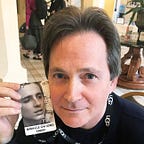5 Common Pitching Mistakes
by Douglas Eboch & Ken Aguado
For people who work in the Hollywood creative community, pitching projects is an unavoidable part of the job. Whether you’re a writer, director, producer, studio executive, agent or manager, you will be called upon to describe and sell various projects on a regular basis. In our book The Hollywood Pitching Bible, we spend 225 pages describing the ways you build various types of pitches for various situations. But in this article we will describe the five most common pitching mistakes we hear from students and entertainment professionals. The below mistakes are mostly applicable to writer pitches, but not entirely.
1. Not understanding the purpose of your pitch.
Admittedly, this is a more common mistake for beginners or aspiring entertainment professionals, but choosing the wrong kind of pitch for a given situation is at the top of the list. Launching into a rambling 15-minute description of a project at a cocktail party is just as misguided as only having a spare one-liner at a formal pitch meeting. You need to craft one kind of pitch to convince someone to read an existing screenplay or see your film, and a completely different type to sell an idea. Pitches to get assignments require still another approach. You can’t craft an effective pitch until you know what your goal is.
2. Pitching plot instead of story.
Whether you’re pitching a narrative story or a reality series (which is often a narrative with “real” people), pitching plot instead of story is always a mistake. Plot is just dry recitation of events: “this happens, then that happens, then…” Story, on the other hand, is a journey that a character takes. Because we only care about plot to the extent it happens to someone we find interesting, pitching plot without a character’s point of view is sure to bore your listener.
3. Not having a good log line.
There are many situations where you will only pitch a log line, so not having a great one for ready use is a rookie mistake. But with longer pitches, you should also employ a good log line before launching into the story. A short log line is the road map for the longer pitch that follows. Once the listener understands the idea you are proposing, they have a context for the more complex details of character, plot and setting as you present them. Crafting a good log line is tough and many pros struggle with the skill. Learn how to do it, and always include one. ADDITIONAL TIP: Make sure to include the genre of your project in most of your log lines!
4. Making your character sound unlikeable.
It pains us to include this common mistake, but we see it over and over again. In a longer narrative (such as a movie or television series) there will be plenty of time to develop complex characters with a dark side. But in a short pitch (and really all pitches are short) always try to describe your lead in a way that makes them sound appealing. This doesn’t mean every character must be a “heroic fireman, who saves puppies in his spare time,” but there is a world of difference between describing someone as a “loser” versus “down on his luck.” When you develop your pitch, consider how you describe the main character and ask yourself “why would anyone care about this character?” Remember, they will only know what you tell them.
5. Improper use of movie comparisons.
This is not only an annoying mistake, but it’s also a raging Hollywood cliché that we’d like to eradicate! The “it’s The Avengers meets Jurassic World” type-comparison is as meaningless as it is pervasive. What does that even mean? Is it about a theme park for superheroes? Are the superheroes fighting dinosaurs? We have no idea. Here’s the solution: always briefly qualify what you mean when you use any comparison. “It’s about a diverse team of heroes — like The Avengers — who travel back in time to battle mighty dinosaurs — like Jurassic World.” Also avoid using old, obscure, or financially unsuccessful movies (Saying “it’s Ishtar meets Fassbender’s Katzelmacher” does not help your pitch). In fact, you’re really probably better off not making comparisons at all in most pitches.
Screenwriter Douglas Eboch and producer Ken Aguado are the co-authors of The Hollywood Pitching Bible. Follow Doug @dougeboch and Ken @kaguado.
